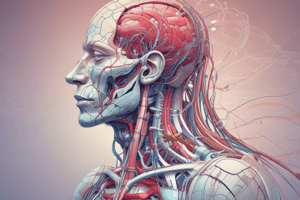Podcast
Questions and Answers
What is the main function of blood described in the text?
What is the main function of blood described in the text?
- Transporting oxygen, nutrients, and cellular wastes (correct)
- Generating energy for body cells
- Maintaining equilibrium within the body
- Producing hormones and enzymes
How does blood help in the excretory function?
How does blood help in the excretory function?
- It picks up cellular wastes and transports them to various organs for removal (correct)
- It releases waste products into the bloodstream for elimination
- It filters waste products through its cellular structure
- It synthesizes waste products into useful substances
What is the primary mechanism by which the body maintains homeostasis?
What is the primary mechanism by which the body maintains homeostasis?
- Negative feedback mechanism (correct)
- Positive feedback mechanism
- Neutral feedback mechanism
- Reactive feedback mechanism
Where does most of the nutrients absorbed from food travel after entering the bloodstream?
Where does most of the nutrients absorbed from food travel after entering the bloodstream?
What is the role of blood in respiratory function?
What is the role of blood in respiratory function?
Flashcards are hidden until you start studying
Study Notes
Functions of Blood
- Transports oxygen from the lungs to cells and carbon dioxide from cells back to the lungs.
- Delivers essential nutrients and hormones throughout the body.
Excretory Function of Blood
- Blood aids in the removal of waste products from metabolism.
- Transports waste to excretory organs like the kidneys for filtration and excretion.
Homeostasis Maintenance
- The body primarily maintains homeostasis through feedback mechanisms.
- Blood plays a crucial role in regulating temperature, pH levels, and fluid balance.
Nutrient Transport Post-Absorption
- Most nutrients absorbed from food travel to the liver via the hepatic portal vein.
- The liver processes, stores, and distributes nutrients to other parts of the body.
Role of Blood in Respiratory Function
- Blood carries oxygen from the lungs to tissues and organs.
- Facilitates the transport of carbon dioxide from cells to the lungs for exhalation.
Studying That Suits You
Use AI to generate personalized quizzes and flashcards to suit your learning preferences.




